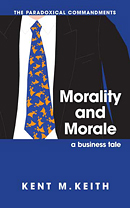|
There are a number of lists and compilations of moral principles and teachings from the world's great religions and spiritual teachers. For example, see World Scripture: A Comparative Anthology of Sacred Texts (A Project of the International Religious Foundation, Paragon House, St. Paul, Minnesota, 1995).
C. S. Lewis published a list of universal moral principles he called "Illustrations of the Tao or Natural Law" in the appendix of his book The Abolition of Man (1944). He quoted from Christian, Jewish, Egyptian, Babylonian, Roman, Old Norse, Greek, Hindu, Australian Aborigine, Chinese, and American Indian sources.
The Universal Moral Code includes five of the Ten Commandments of Moses, found in the Jewish Torah and the Christian Bible (Exodus 20). Those five are:
Honor your father and your mother.
You shall not murder.
You shall not commit adultery.
You shall not steal.
You shall not give false testimony against your neighbor.
Perhaps the best-known universal moral principle is "the golden rule" or ethic of reciprocity. Its negative form is "Do not do unto others as you would not have them do unto you." Its positive form is "Do unto others as you would have them do to you." The golden rule can be found in Christian, Jewish, Islamic, Buddhist, and Confucian texts, among others.
The Code of Hammurabi is one of the oldest moral/legal codes known to historians. Hammurabi was King of Babylon about 2250 B.C. The Code of Hammurabi has been translated into 282 sections that set forth business, family, social, and political rules. The sections include penalties for false accusations, adultery, incest, assault, medical malpractice, shoddy workmanship, and negligence. (See The Code of Hammurabi, King of Babylon About 2250 B.C. by Robert Francis Harper, University Press of the Pacific, Honolulu, 2002.)
|
|



